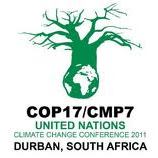2011 United Nations Climate Change Conference
| United Nations Climate Change Conference (COP17/CMP7) | |
|---|---|
 | |
| Information | |
| Date: | 28 Nov.–9 Dec. 2011 |
| Location: | Durban, South Africa |
| Webpage | cop17-cmp7durban.com |
The 2011 United Nations Climate Change Conference will be held in Durban, South Africa, from 28 November to 9 December 2011.[1]
The conference is officially referred to as the 17th session of the Conference of the Parties (COP 17) to the United Nations Framework Convention on Climate Change (UNFCCC) and the 7th session of the Conference of the Parties serving as the meeting of the Parties (CMP 7) to the Kyoto Protocol. In addition, the two permanent subsidiary bodies of the UNFCCC – the Subsidiary Body for Scientific and Technological Advice (SBSTA) and the Subsidiary Body for Implementation (SBI) – are likely to hold their 35th sessions. The 2010 United Nations Climate Change Conference extended the mandates of the two temporary subsidiary bodies – the Ad Hoc Working Group on Further Commitments for Annex I Parties under the Kyoto Protocol (AWG-KP) and the Ad Hoc Working Group on Long-term Cooperative Action under the Convention (AWG-LCA) – so they are expected to meet as well.
A primary focus of the conference will be to secure a global climate agreement as the Kyoto Protocol's first commitment period (2008–2012) is about to end. [2] It is also expected to focus on "finalising at least some of the Cancun Agreements", reached at the 2010 Conference, such as "co-operation on clean technology", as well as "forest protection, adaptation to climate impacts, and finance - the promised transfer of funds from rich countries to poor in order to help them protect forests, adapt to climate impacts, and "green" their economies".[3]
A month before the Conference began, the BBC highlighted two contentious proposals which had been submitted - one by Russia, the other by Papua New Guinea, both aiming to amend the United Nations Framework Convention on Climate Change. Russia's proposal[4] would bring about a "periodic review" whereby countries currently categorised as "poor" could be recategorised as "rich", and thus obliged to shoulder greater obligations in the combat against climate change. BBC Environment correspondant Richard Black commented that the proposal would be "provocative and explosive, if Russia pushes it", because potentially affected countries, such as China and Brazil, would "push back very strongly". Papua New Guinea's proposal[5], submitted by Ambassador Kevin Conrad with the support of Mexico, would introduce a "last resort" mechanism to break any deadlocks in climate change negociations through a three-quarters majority vote, thus clarifying the decision-making process under the Convention. Describing the proposal as "intriguing", Black noted that although it would theoretically enable developing countries to use their numerical superiority to adopt any kind of world-wide binding obligation, in practical terms they would still need the approval of rich countries to secure funding.[3]
See also
References
- ^ http://unfccc.int/meetings/unfccc_calendar/items/2655.php
- ^ [1], The Guardian
- ^ a b "Durban: A summit of small steps?", BBC, 31 October 2011
- ^ "Proposal from the Russian Federation to amend article 4, paragraph 2 (f), of the Convention"
- ^ "Proposal from Papua New Guinea and Mexico to amend Articles 7 and 18 of the Convention"
